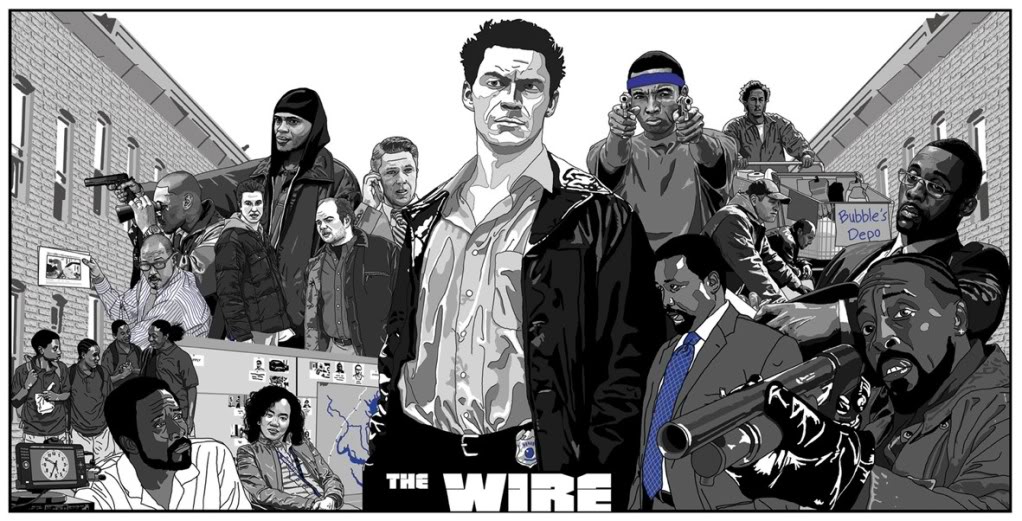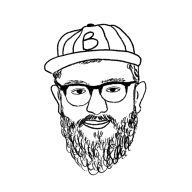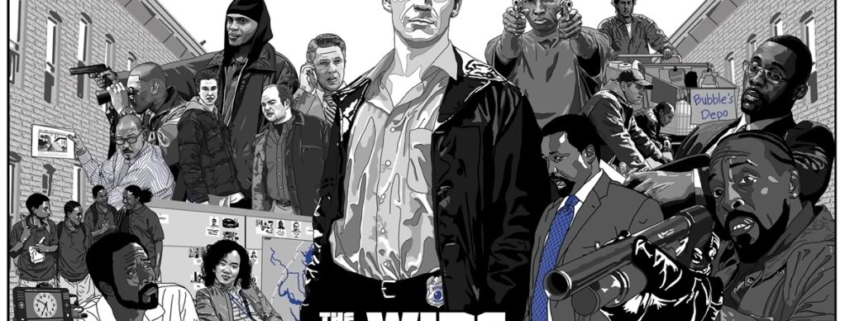Thoughts on The Wire, Writing, and Perspective

When I was nineteen, I began working on my first book. My goal was to have it published before I turned twenty-one; I would be one of the youngest published writers in history. After my undergrad English classes at the Metro campus of CU Denver ended for the day, I’d spend an hour or two in the computer lab, typing away. The computer lab was located in the basement of a remodeled, old Greek Orthodox Church, now used for classrooms and labs. I typed away, working on my magnum opus, which was all about how pissed off I was at church and religion. It was terrible stuff, but I tried to make it sound literary by titling each chapter with a line from T.S. Elliot’s poem, “The Love Song of J. Alfred Prufrock.” I sent queries to agents and publishers, and now feel guilty that I was one of those people who was not yet ready to publish, but thought he was, and only added to the agents’ stacks of queries and manuscript submissions. At best, the manuscript was read by young publishing interns in New York. At worst, it was promptly (and rightfully) deleted from their computers.
After some months of only silence in response to my queries, I came to realize that I had made a horrible mistake. Because while there are those who write best-selling books in their early twenties, most writers don’t “hit it big,” so to speak, until they are are well advanced in years, probably for good reason—developing the craft of writing takes long, hard work, with very little immediate reward beyond catharsis. But when you’re young and hungry to get your writing and ideas out into the world, you don’t want to hear about limitations. At least, I didn’t.
* * *
My friend Mike is a professional photographer. He has made money shooting commercial photos for Apple and Nike but has also been able to curate a career shooting projects he loves: Syrian refugees, bison environmentalists in Wyoming, intimate profile portraits of actors at the Sundance Film Festival, and whatever other random, artsy, photo stuff he wants. I am jealous of Mike because while we’re about the same age, he’s four years into making a living-wage career from his art. He flies around the world to New York and South America and the Middle East (of course, he claims I am romanticizing his job). I’m not sure if I’m jealous because I’m not quite at his level, or because I’m simply impatient, or both.
I think writing, good writing, really is one of those things that simply takes a long time. Maybe not for everyone, but for most of us. And in the end, perhaps the slow-cooking development is a good thing, because the time and patience (and, hopefully, wisdom and craft) developed along the way are ultimately what make writing great. There’s just a slower immediate return.
Recently, I finished watching the sixtieth and final episode of The Wire. I’m nearly a decade behind, but when I finished it, I joined the (previously annoying) masses of people (albeit some years late) who ask everyone they meet, “Have you watched The Wire? You have to watch The Wire.”
The Wire first premiered in 2002 on HBO. Initially billed as a show about the Baltimore drug scene from the perspective of both drug dealers and police (“poh-lice”), each season focuses on a slightly different subject—the streets, the docks, the schools, a political race for mayor. Each season has its own flair, but with a consistent cast of characters and continuing plot lines. What results is a gritty and realistic (yet not completely despairing) depiction of race, drugs, law enforcement, black identity, and politics. The Wire shows a world in which law enforcement and city politicians are so concerned with statistics and appearances that they fail to make any real impact. It shows good cops driving drunk and bad cops abusing their power, all while climbing the chain of command. What we really find out is this: The game is the game, whether it’s slinging drugs on the corner, climbing up the police ladder, passing standardized school tests, or becoming mayor. There’s pressure from all sides to show immediate results, demonstrate strength, and forgo solid groundwork needed for long-term change. But in the series, where true change actually occurs is in hard, slow, deliberate work—the kind of work that doesn’t reap immediate results.
The show’s name derives from the cops’ wiretap used to trace drug dealers’ phones. From this tap, they’re able to get information on murders, drug shipments, real estate deals, locations, meetings, and so on. But listening to the wire is a slow, tedious process—one that almost always gets shut down by the chain of command for producing seemingly little results—and yet, ultimately, it is one of the few things on the show that ends up doing some good.
I came away from The Wire with this notion: the change that we often need in our world is that which comes about only through hard work, dedication, and integrity. True change comes from an emphasis on long-term goals rather than short-term results. While The Wire is about many things, it also a meditation on perspective and patience, and how crime, race relations, and effective law enforcement require tough, persevering work to get anywhere in the long-run, to make any sort of lasting change.
The same tenacity is required in writing and art.
Though we write because we love it and because it’s who we are or what we are called to do (even sitting down to write this blog post, strangely enough, has made me feel better and more complete than I was feeling an hour ago), we also understand that it could be years before we have anything tangible to show for it. I wish that when I was younger, someone would have told me this—not that it was hopeless to get published or to write a book, but that it was most likely foolish because it would require many years of patience and suffering. But this is what it takes to do any sort of art or make any sort of lasting social impact. There is no app. True change and impact require hard work and patience. There are no shortcuts. Shortcuts give you shitty bondage novels and corrupt police forces.
* * *
After I was done writing for an hour or two at night in the basement computer lab of the remodeled Greek Orthodox church, I would take the Federal bus from downtown back to my home on Lowell Boulevard. I’d wait for the bus, listen to Radiohead’s In Rainbows or Say Anything, and watch the city lights of Denver twinkle around me, the occasional chill of cold air whipping through the buildings. The moon would silhouette through the skyscrapers. And in that moment, I sometimes felt like I was onto something, that I had finally found something of worth and beauty. Even though I was young and wanted to do big things with my life, for one moment, I didn’t care about the end results, or care about how long it might take to get there. I was happy just to be participating in something I found meaningful.
It’s not often, but every now and then, the two align: the work I’ve put into sowing actually reaps some tangible benefits. But it’s still work, and I guess that’s the point. There are no shortcuts to great art or lasting social change. I wonder if this is something that today’s hurried society is increasingly losing sight of. As William S. Burrough’s said, “Cheat your landlord if you can and must, but do not try to shortchange the Muse. It cannot be done. You can’t fake quality any more than you can fake a good meal.”

Levi Rogers is a writer and coffee roaster out of Salt Lake City, UT. He lives with his wife Cat, his dog Amelie, and his many socks, all of which have holes. He’s currently an MFA candidate at Antioch University Los Angeles.





